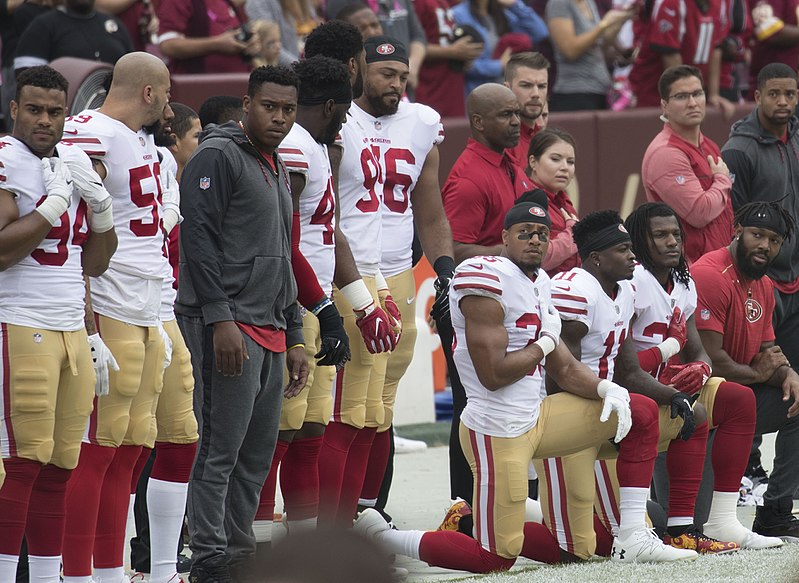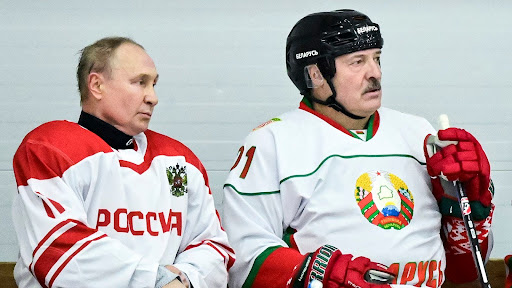In recent years, as the American political sphere has become more polarized, news pundits, online commentators, and politicians have repeatedly declared that professional athletes are “out-of-touch-millionaires” who should “shut up and dribble.” Players such as Colin Kaepernick, LeBron James, Stephen Curry, and Richard Sherman have pushed back against the ‘whitelash’ to become more politicized. But are these assumptions that athletes have only recently grown more political accurate? This question has a long and complicated answer, often overshadowed by personal political beliefs and the debate over the rights of athletes to use their platform to share their opinions.
To understand the relationship between sports and politics, one needs to first understand the relationship between sports and society. Going back millennia, pastimes and sports have symbolized societies’ values and provided a glimpse into how people spent their free time. The Mayans used sports to determine who to use for ritual sacrifices. Medieval kings held competitions to show their wealth, allowing the knights to prove their battle prowess and chivalry. Gladiators were often defeated enemies of Rome forced into slavery for entertainment.
Sports, like movies and music, have also been an aspect of imperialism, both historically and culturally. For example, the popularity of cricket in India, brought to the country by British sailors during the British Empire, which has continued to be the most popular sport in India, long after independence from Great Britain. Today, NBA tours of China, plus NFL and MLB visits to London, are cultural exports that create intercultural connections but also establish soft power.
Leaders, autocrats, and powerful individuals have frequently used sports to assert their political dominance. In 1936, Hitler attempted to use the Olympics to show off his regime and its ideologies to the rest of the world, but was undermined by Jesse Owens. Owens, an African-American track and field athlete, made a political statement when he won four gold medals, beating the athletes representing Hitler’s Germany on their home turf. Owens’ motivation for victory was never explicitly political, but due to the climate surrounding the Games, he had made a statement nonetheless.
The Olympics, both ancient and modern, have always been political. In ancient Greece, independent city-states came together to discuss politics, form political and military alliances, and celebrate military victories, all while their representatives competed in races and games of strength. Modern Olympics have also seen increased political activity, especially in the past half-century. From the 1968 Mexico City Olympics—where U.S. Olympians Tommie Smith and John Carlos raised their fists in solidarity with the black power movement—to the 1972 Munich Olympics—where 11 Israeli athletes were kidnapped and killed by a Palestinian terrorist group—politics have shone through the veil of non-political competition that is often touted by the International Olympic Committee.
At the national level, American athletes also have a history of taking political stances. One of the most notable examples is Muhammad Ali, who stood against the Vietnam War very early on, and refused to serve in the army. He was banned from boxing by U.S. authorities because of his stance, and soon became a figure of black power and the Civil Rights Movement. More recently, basketball’s biggest star, Lebron James, said that NFL team owners have a “slave mentality.” While James’ comments received backlash, a closer look reveals that his comments are not unfounded. The NFL’s racial demographics are unevenly represented in the ownership. Every NFL CEO or owner is white, while white players make up less than 30% of NFL athletes. Considering the danger of the sport and the lack of a fallback for players in case of injury, players are often seen as exploited by billionaire owners.
Recently, more and more professional players are using their platforms to exercise their political views and support wider conversations about civil rights. This has prompted a violent reaction by fans who see their protests as disrespectful. In response to the silent protests, some team owners have also implemented rules restricting player protests on game days, with many interpreting this as suppression of speech and an infringement on players’ rights. Originally, to address the growing controversy, the NFL passed an anthem policy in May 2018, in tandem with the NFL owners. This policy stated that any player on the field was required to stand, but alternatively players could remain in the locker room during the anthem. Under this policy, teams could be fined if players knelt on the field, rather than staying in the locker room as their form of protest. By July, the NFL Players’ Association and NFL announced that the policy would be repealed and left it up to individual teams to create their own national anthem policy.
The controversy surrounding player protests continues today. Colin Kaepernick, the NFL player who started the silent protests and who by all measures still has the skills to play in the NFL, brought a lawsuit against NFL ownership, claiming they conspired to keep him from playing because of his protests. In February 2019, the parties reached a confidential settlement.
Vice President Mike Pence also used the protests to make a political statement when he walked out of a Colts–49ers game in 2017, which many criticized as an expensive political maneuver. The accusations of wasting taxpayer money come from Pence’s schedule to fly from Las Vegas to Indianapolis—where the Colts were playing the 49ers, a team that was leading the protests—when Pence had another event in Los Angeles the next day. Trump later tweeted “I asked @VP Pence to leave stadium if any players kneeled, disrespecting our country.” Given the teams that were playing and the ongoing barbs from both sides of the debate, it is not hard to assume that Pence went to the game to make his own anthem protest, even if he thought protests related to the national anthem were “disrespectful.”
Political controversy in sports is not just limited to the professional level. The National Collegiate Athletic Association (NCAA) makes billions every year but refuses to pay its players, claiming that they are paid with “free” education. Almost no NCAA football or basketball players take full advantage of their NCAA scholarships. Some student athletes are relegated to useless or even fake degrees, such as the fake African-American studies classes discovered at University of North Carolina Chapel Hill in 2014. This keeps the athletes academically eligible, even if they never see the inside of a classroom. Many top-tier players don’t even finish their university degree, disproving NCAA claims of a free education. This is especially so if they leave school early, whether by their own volition, by entering the draft, or through the loss of scholarships due to a career-ending injury.
Throughout history, sports have usually been seen as leisure for the majority of the population, separate from serious matters of politics and influence. But sports have always played some role in the distribution and use of power, particularly as a show of national strength on an international stage. Today’s athletes are taking more of the political power that comes with their platform and using it to explore and amplify their agendas. This reflects the populist movements of recent years and cannot be discounted. Players are no longer going to “shut up and dribble.”
This article is the first installment of a column that examines the relationship between sports and politics. Future articles will discuss the responsibilities, methods, and motives of politically-engaged athletes and other sports figures, the benefits and consequences of using their influence, and how the organizers of sport (leagues, owners, and other organizations) and political figures have reacted.


